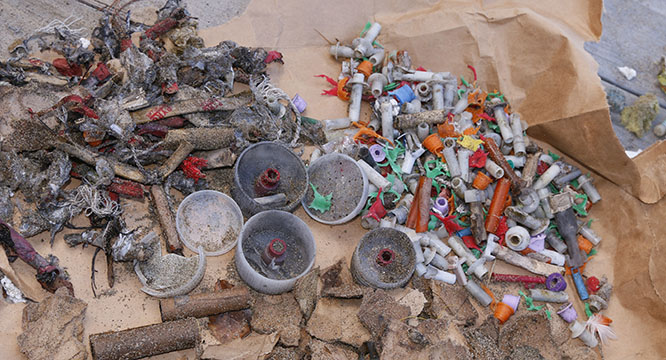All around San Francisco Bay during Fourth of July celebrations, brightly colored fireworks light up the night sky.

Fireworks debris that washed up in February on the beach at San Francisco’s Aquatic Park demonstrates the potential of fireworks displays to cause environmental issues. Photo by David McGuire, sharkstewards.org
By Sejal Choksi-Chugh
Published: July, 2016
All around San Francisco Bay during Fourth of July celebrations, brightly colored fireworks light up the night sky. It’s a fun tradition. But how much does the rockets’ red glare pollute the Bay?
Fireworks are often set off over water, because setting them off over land creates a risk of fire. However, fireworks can cause so much pollution that some communities ban them over lakes used as drinking water sources.
After two fireworks shows over San Francisco Bay early this year, held as part of the Super Bowl festivities, several reports of fireworks pollution came in to Baykeeper’s Pollution Hotline. The morning after the first fireworks display, swimmers in the water at San Francisco’s Aquatic Park ran into significant plastic and cardboard debris. That day, National Park Service staff removed charred fuses, plastic and cardboard pieces from the Aquatic Park beach, filling four 50-gallon trash containers.
Following the second fireworks show a week later, 30 more pounds of fireworks debris washed up at the Aquatic Park beach. More continued to wash up for weeks. It’s likely that even more remained in the Bay, washed up on other shorelines, or washed out into the Pacific Ocean.
This pollution doesn’t have to happen. There are methods of preventing, or at least minimizing, pollution from fireworks. In San Diego, companies putting on fireworks displays are required to use practices that give maximum protection to the body of water below. Here are some ways to do that:
Replace perchlorate with less toxic substances.
Perchlorate is a chemical used in fireworks to create bright flashes of light. But once perchlorate is in the water, it can harm people and wildlife. Alternative fireworks create bright flashes using less toxic substances.
Remove debris immediately.
Within 24 hours, cardboard, plastic and other debris should be collected from everywhere it falls on the water or washes onto shore.
Prevent fireworks from washing overboard.
When fireworks are launched from barges, entire boxes can fall into the water before they are even set off. Fireworks aboard boats must be properly secured at all times.
Baykeeper is advocating for new agency regulations that give San Francisco Bay these protections from fireworks pollution, plus more. The company that puts on the majority of local fireworks displays, Pyro Spectaculars, is cooperating with us on this effort to improve fireworks shows over the Bay.
Following this year’s Fourth of July fireworks displays by San Francisco and Berkeley, Baykeeper and the nonprofit organizations Shark Stewards will hold two investigative cleanups. We’ll investigate how much fireworks debris has washed onto the shorelines at the Berkeley Marina and at Aquatic Park in San Francisco. We’ll clean up whatever we find. And we’ll continue to work with the company and local agencies to improve practices around future fireworks displays—toward a Declaration of Independence for San Francisco Bay from future fireworks pollution. To learn more about Baykeeper and support our work, visit our website at baykeeper.org.
Sejal Choksi-Chugh is the Executive Director of San Francisco Baykeeper. Baykeeper uses on-the-water patrols of San Francisco Bay, science, advocacy and the courts to stop Bay pollution. To report pollution, call Baykeeper’s hotline at 1-800-KEEP-BAY, e-mail hotline@baykeeper.org, or click “Report Pollution” at baykeeper.org.

